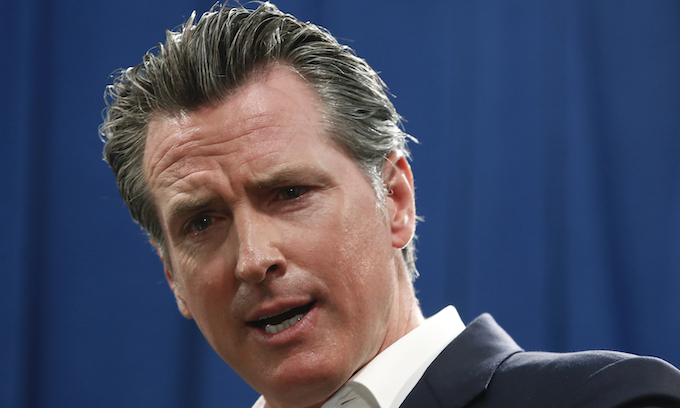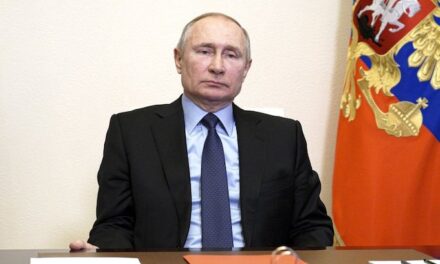Gov. Gavin Newsom has billions of problems, literally.
His management of the state’s response to the coronavirus pandemic has caused consternation statewide.
And that may not even be the biggest threat to his tenure in office months down the line.
The scandal over unemployment benefits has grown exponentially, with the total fraudulent payments potentially reaching $31 billion — resulting in part from schemes involving prison inmates and criminal gangs in Russia, China and Nigeria.
That goes way beyond the bad optics of the governor dining at a high-end restaurant in violation of his own COVID-19 guidelines.
The coronavirus pandemic may subside before a recall election; fallout from the unemployment debacle may not.
Now Newsom has another multibillion-dollar problem: tech investor Chamath Palihapitiya.
The CEO of Social Capital and former Facebook executive last week announced his support for the effort to recall Newsom. In doing so — on Twitter, of course — Palihapitiya linked to chamathforca.com. The website has the headline “Chamath for California governor,” and though it was built by supporters, it includes the platform he would run on.
“California is a mess — it’s too expensive, our teachers are underpaid, and our schools aren’t good enough,” the website says, adjacent to a picture of the billionaire.
Palihapitiya calls for cutting state taxes to zero, paying teachers a minimum $70,000 salary, creating a global center for tech and climate jobs, distributing free school vouchers, providing student loan relief and paying families $2,000 for every newborn child in California.
As of Friday, he had not publicly committed to running in the gubernatorial replacement election that would run concurrently with a recall election.
But his ability to pour tremendous resources into qualifying the recall for a special election and his own potential campaign could be a game-changer.
Palihapitiya is a Democrat who has contributed heavily to mostly Democratic candidates and causes in the past. He has leveled sharp criticism at Newsom.
He told CNBC that the Democratic governor “has done a terrible job,” citing crime rates, high taxes, poor air quality and residents and businesses leaving the state.
Even if he keeps his money and himself largely on the sidelines — which seems unlikely — Palihapitiya further shatters the narrative being constructed by Newsom’s defenders: The recall is a partisan gambit by Republicans and supported by right-wing extremists.
The governor’s backers had some basis for those claims. Establishment Republican business and political figures are helping finance and develop strategy for the signature-gathering and, if successful, the recall campaign. Some of them back former San Diego Mayor Kevin Faulconer as a replacement candidate.
The Los Angeles Times examined the backers of the recall and found among them “far right movements including QAnon, virus skeptics.”
But even before Palihapitiya surfaced publicly, other tech leaders who had backed Democrats in the past had joined the recall movement.
That’s just part of the evolving recall dynamics.
Faulconer has gained considerable exposure with his constant criticism of Newsom on social media and in television interviews. However, Faulconer’s candidacy has brought him increased scrutiny — some flattering, some not so much. In particular, his conversion from first voting against Donald Trump then voting to re-elect the former president was greeted with skepticism, coming as it did while he was gearing up to run for governor.
Further, a uniquely San Diego political brawl is brewing. Carl DeMaio, radio talk-show host and former San Diego City Council member, has launched a website through his Reform California organization targeting Faulconer (faulconerfailures.org) that lists a litany of criticisms of the former mayor. Reform California is also assisting the recall effort.
Granted, there’s no love lost between the two, who were early Republican competitors in the run for mayor in the 2013-14 special election and sharply disagree on several policy issues.
Then Republican Rep. Darrell Issa, who defeated DeMaio and others to win the 50th Congressional District last year, sprung to Faulconer’s defense on Twitter.
“@Carldemaio is using @ReformCalif to lie about @Kevin_Faulconer, our strongest GOP candidate to defeat Gavin Newsom,” Issa wrote. “I’m deeply disappointed that Carl spends more time tearing down conservative Republican leaders working to unite our party than supporting them.”
DeMaio specifically questions Faulconer’s conservative credentials, noting he has advocated tax increases, a government-run power utility and the city’s Climate Action Plan.
“Faulconer’s record is atrocious,” DeMaio said in an interview. He has not publicly backed a candidate to replace Newsom, but added there may be others worthy of consideration.
John Cox, the Rancho Santa Fe businessman who lost to Newsom in 2018, remains a contender for either the special replacement election this year or the regular 2022 election.
Meanwhile, dilemmas abound on the Democratic side. Right now, the party and allied groups are set on defending Newsom. Yet there’s also a fail-safe effort going on to find a major Democratic replacement candidate in case the recall succeeds.
It remains to be seen whether a candidate can be found with gravitas and experience to tackle the state’s problems — and is neither aligned with nor hostile to Newsom. Even if such a candidate exists, pulling off a “vote no on recall, yes for me” campaign would be tough.
That didn’t work in 2003, when Democratic Lt. Gov. Cruz Bustamante ran in the replacement election during the recall of Gov. Gray Davis. The recall succeeded and Arnold Schwarzenegger was elected governor.
At the moment, all that is a sideshow to Newsom’s predicament.
The recall was launched before the coronavirus pandemic, had no big-time backing and didn’t seem to be going anywhere.
The effort gained momentum from Newsom’s infamous attendance at a birthday party — for a lobbyist friend, no less — at The French Laundry restaurant in Napa Valley in November.
Now, nobody seems to be talking about that much anymore. For Newsom, that may not be a good thing.
This story originally appeared in San Diego Union-Tribune.
___
(c)2021 The San Diego Union-Tribune
Visit The San Diego Union-Tribune at www.sandiegouniontribune.com
Distributed by Tribune Content Agency, LLC.
—-
This content is published through a licensing agreement with Acquire Media using its NewsEdge technology.



















The government swamp has become so large and powerful that Democrat politicians are largely above the law. They do not have to be worried about being held accountable for their crimes. And now that we have the “Socialist Democrat Party State”,
We the People are pretty much screwed!
Hence why its NOT JUST Newsome who needs to get recalled. ITS EVERY DAMN POLITICIAN IN (or from) Commiefornia.. Both in the state, and in congress!
Oh, California voters, how did a communist dictatorship, under Gavin suit you? The problem is, you sheep / useful idiots of Lenin, will probably vote in another communist, after Newsom is ousted by the recall effort. Like Einstein stated: “The definition of insanity is doing the same thing over and over again and expecting a different result”.
Exactly 100% You took the words right out of my mind!
The CEO of Social Capital and former Facebook executive last week announced his support for the effort to recall Newsom. In doing so — on Twitter, of course — Palihapitiya linked to chamathforca.com. The website has the headline “Chamath for California governor,” and though it was built by supporters, it includes the platform he would run on.
Vote this liberal screw ball in and California will be going from the frying pan to the fire making Gruesome Newsom look like Ronald Regan!! The voters of Californication deserve what they get!!
Hey Californication, you can start by electing a true conservative Governor and closing your borders to illegal aliens!! That won’t happen with their rigged voting machines!
And even IF they recall him, who’s to say the COMMIES IN the state legislature, won’t KEEP RUINING the state!
Whilst it would be awesome if he were removed from office, I see very little chance that would happen. Even if it did, in less than ten years he would run again, and be “elected” again.
“Palihapitiya calls for cutting state taxes to zero, paying teachers a minimum $70,000 salary, creating a global center for tech and climate jobs, distributing free school vouchers, providing student loan relief and paying families $2,000 for every newborn child in California.” I am having a real hard time telling the difference one progressive idiot and the other one, what a joke. Teachers, get rid of teachers unions, until that is done, education is lost. Paying families $2000.00 for every newborn child, my God man the ignorance of these idiots never ceases to amaze me. Like mittens romney from UT, never underestimate the ignorance of the man.
For at least 5 years, i’ve been saying WE Need to eliminate EVERY DAMNABLE teachers union out there, PERIOD. IF we ever wish to stand a chance of winning BACK OUR schools…
There are four things that must be done before, even mediocre, let alone quality education is ever regained. 1. Eliminate ALL teachers unions, they support those who pay dues, not the children. 2. Eliminate the Department of Education, a one sized fits all out of DC will never work, it provides nothing but a source of indoctrination for whichever party that is in charge at the time, split the $100 million dollar a year wasted budget among the states, there is your money for education. 3. Eliminate ALL teacher tenure, longevity does not guarantee or have anything to do with quality, would you continue to take your care to a mechanic that could not fix it? Would the ladies continue to go to a hair dresser who screwed up their hair every time? 4. Place the control over education at state level, with ELECTED BOARD MEMBERS that answer to the voters not someone’s cousin appointed by some state office holder. Problem solved.
ADD in “PUT their jobs being KEPT< TO POSITIVELY IMPROVING NUMBERS for grades of their students!!